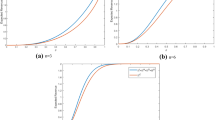Abstract
In a market of indivisible objects where a buyer consumes at most one object, the buyer-optimal auction is a multi-item generalization of Vickrey's second-price auction. If the optimal auction is formulated as a strategic game, it is well-known that it satisfies good incentive properties, i.e., the honest strategy profile is a Nash equilibrium, a unique perfect equilibrium and a dominant strategy equilibrium. For each of the three incentive properties, it is shown that the optimal auction is aunique auction satisfying the property. The uniqueness results are derived in a general setting with budget constraints and non-linear utilities.
Similar content being viewed by others
References
Alkan A (1992) Equilibrium in a matching market with general preferences. In: Majumdar (ed) Equilibrium and Dynamics, Macmillan, London
Alkan A, Gale D (1990) The core of the matching game. Games and Economic Behavior 2:203–212
Crawford V, Knoer EM (1981) Job matching with heterogeneous firms and workers. Econometrica 49:437–450
Demange G, Gale D (1985) The strategy structure of two-sided matching markets. Econometrica 53: 873–888
Demange G, Gale D, Sotomayor M (1986) Multi-item auctions. Journal of Political Economy 94:863–872
Grandmont J-M (1972) Continuity properties of a von Neumann-Morgenstern utility. Journal of Economic Theory 4:45–57
Hildenbrand W (1974) Core and equilibria of a large economy. Princeton University Press, Princeton, New Jersey
Hirshleifer J, Riley JG (1992) The analytics of uncertainty and information. Cambridge University Press, Cambridge, UK
Kaneko M (1982) The central assignment game and the assignment markets. Journal of Mathematical Economics 10:205–232
Kaneko M, Yamamoto Y (1986) the existence and computation of competitive equilibria in markets with an indivisible commodity. Journal of Economic Theory 38:118–136
Loève M (1977) Probability theory I. Springer-Verlag, New York
Miyake M (1990) Continuous representation of von Neumann-Morgenstern preferences. Journal of Mathematical Economics 19:323–340
Miyake M (1994) Comparative statics of assignment markets with general utilities. Journal of Mathematical Economics 23:519–531
Okada A (1981) On the stability of perfect equilibrium points. International Journal of Game Theory 10:67–73
Osborne MJ, Rubinstein A (1994) A course in game theory. MIT Press, Cambridge
Roth A, Sotomayor M (1992) Two-sided matching. In: Aumann RJ, Hart S (eds) Handbook of game theory with economic applications, volume I, North-Holland, Amsterdam
Selten R (1975) Reexamination of perfectness concept for equilibrium points in extensive games. International Journal of Game Theory 4:25–55
Vickrey W (1961) Counterspeculation, auction, and competitive sealed tenders. Journal of Finance 16:8–37
Wilson R (1992) Strategic analysis of auctions. In: Aumann RJ Hart S (eds) handbook of game theory with economic applications, volume I, North-Holland, Amsterdam
Author information
Authors and Affiliations
Additional information
I would like to thank three anonymous referees for detailed comments and constructive suggestions. I would also like to thank Edward J. Green and John G. Riley for their valuable comments and advice on earlier drafts of this paper. I am solely responsible for any errors.
Rights and permissions
About this article
Cite this article
Miyake, M. On the incentive properties of multi-item auctions. Int J Game Theory 27, 1–19 (1998). https://doi.org/10.1007/BF01243191
Received:
Revised:
Accepted:
Issue Date:
DOI: https://doi.org/10.1007/BF01243191




